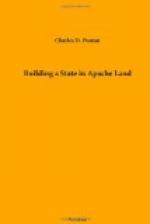The Spaniards had located a presidio at the base of the Santa Rita Mountains on the Santa Cruz River, a stream as large and as beautiful as the Arno, flowing from the southeast, and watering opulent valleys which had been formerly occupied and cultivated. The presidio was called Tu-bac (the water). The Mexican troops had just evacuated the presidio of Tubac, leaving the quarters in a fair state of preservation, minus the doors and windows, which they hauled away.
The presidio of Tubac was about ten leagues south of the mission church of San Xavier del Bac, on the Santa Cruz River, on the high road (camino real) to Sonora and Mexico; consequently we struck camp at the Mission San Xavier del Bac, and pulled out for the presidio of Tubac to establish our headquarters and future home.
There was not a soul in the old presidio. It was like entering the ruins of Pompeii. Nevertheless we set to work, cleaned out the quarters, repaired the corrals, and prepared to make ourselves as comfortable as possible.
The first necessity in a new settlement is lumber, and we dispatched men to the adjacent mountains of Santa Rita to cut pine with whip-saws, and soon had lumber for doors, windows, tables, chairs, bedsteads, and the primitive furniture necessary for housekeeping. The quarters could accommodate about three hundred men, and the corrals were ample for the animals. The old quartel made a good storehouse, and the tower on the north, of which three stories remained, was utilized as a lookout. The beautiful Santa Cruz washed the eastern side of the presidio, and fuel and grass were abundant in the valley and on the mountain sides. It was not more than a hundred leagues to Guaymas, the seaport of the Gulf of California, where European merchandise could be obtained. There were no frontier custom houses at that time to vex and hinder commerce.
In the autumn of 1856 we had made the headquarters for the company at Tubac comfortable, laid in a store of provisions for the winter, and were ready to begin the exploration of the country for mines. When you look at the Santa Rita Mountains from Tubac, it seems a formidable undertaking to tunnel and honeycomb them for mines. Nevertheless, we began to attack with stout hearts and strong arms, full of hope and enthusiasm. The mines in the Santa Rita Mountains had been previously worked by the Spaniards and Mexicans, as was evident by the ruins of arrastres and smelters. Gold could be washed on the mountain sides, and silver veins could be traced by the discolored grass.
As soon as it was known in Mexico that an American company had arrived in Tubac, Mexicans from Sonora and the adjacent States came in great numbers to work, and skillful miners could be employed at from fifteen to twenty-five dollars a month and rations. Sonora furnished flour, beef, beans, sugar, barley, corn, and vegetables, at moderate prices.




